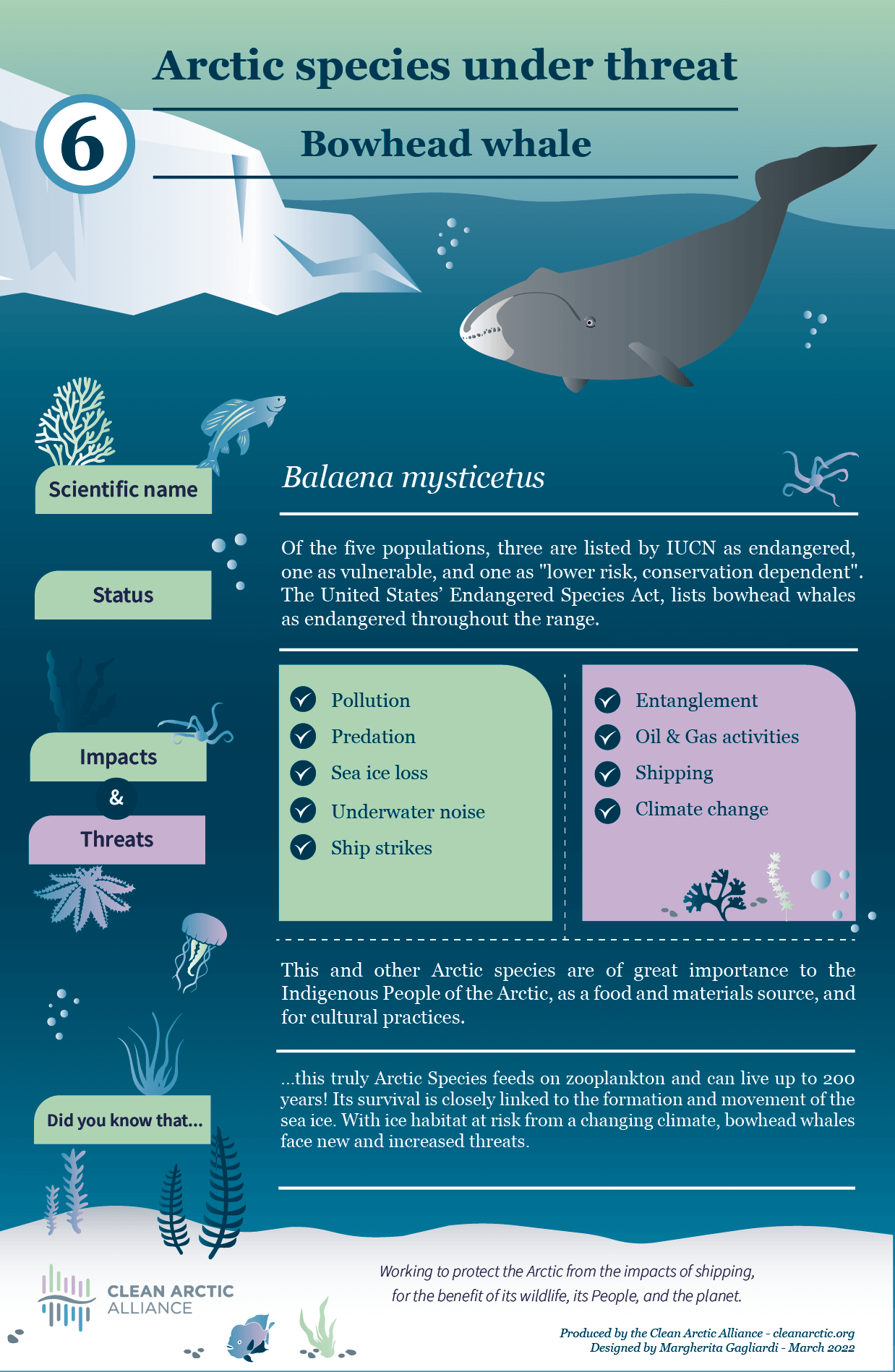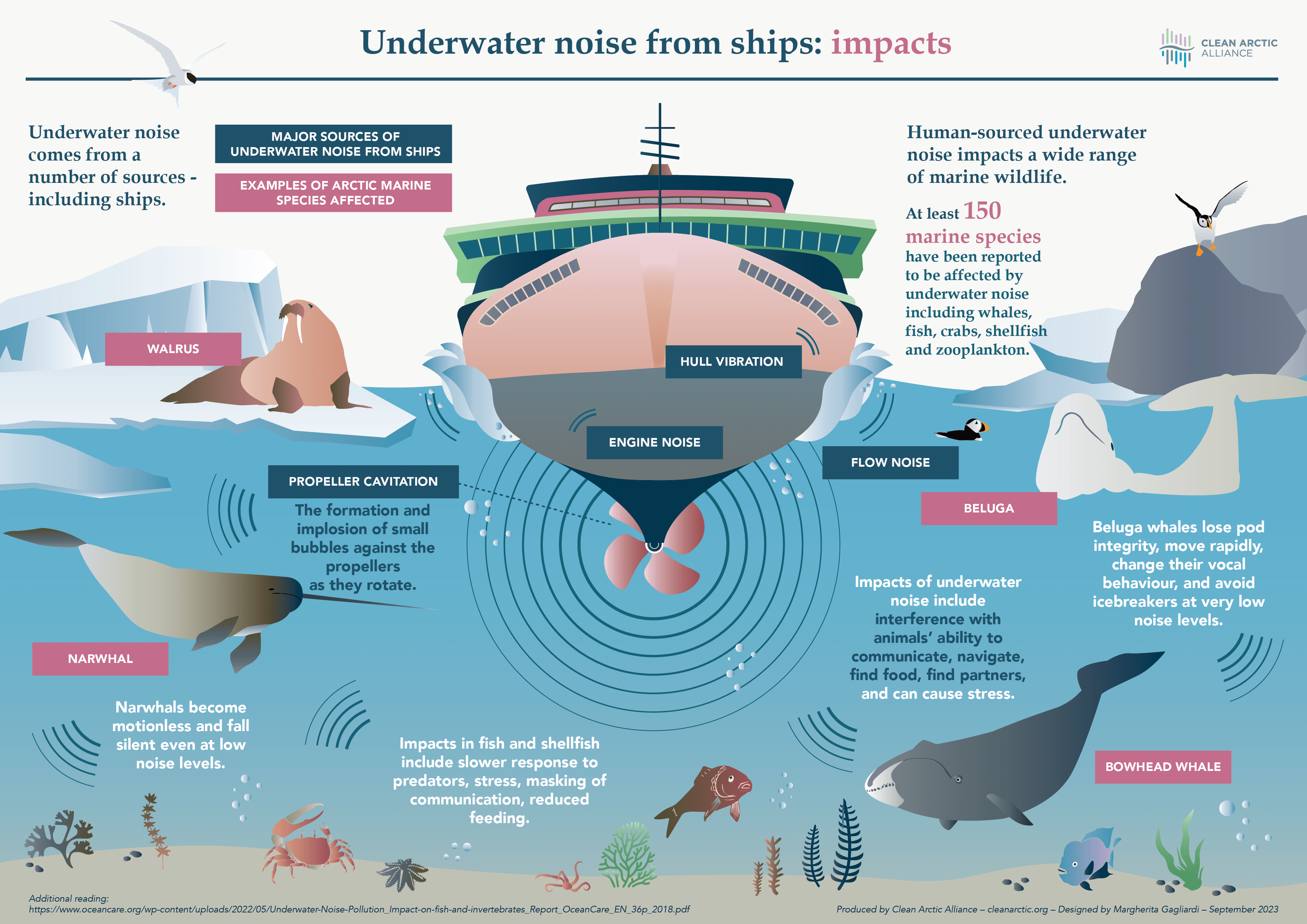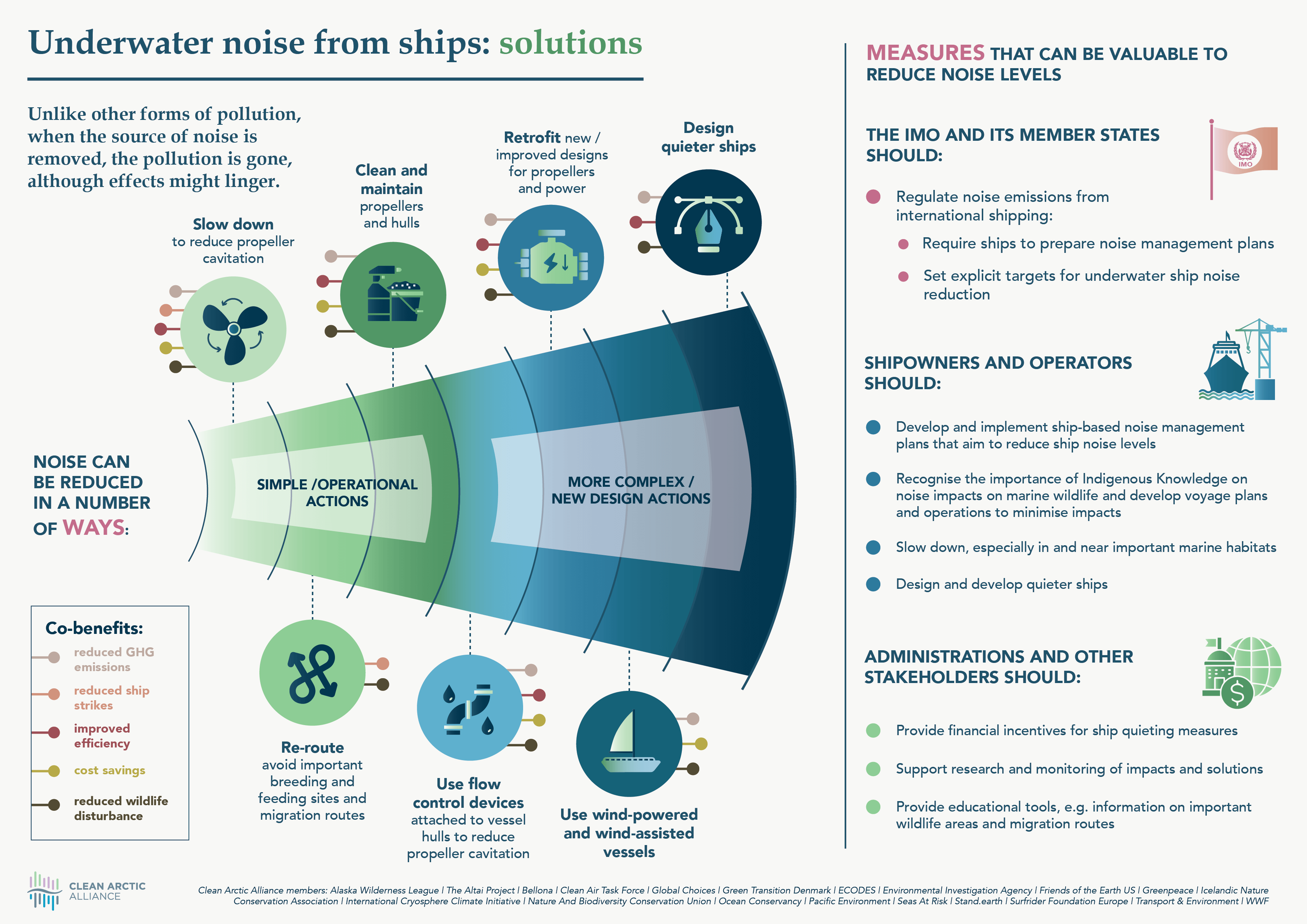Infographic: Arctic Species Under Threat
27 January 2023:- The Clean Arctic Alliance today welcomed progress made this week by the International Maritime Organization (IMO) to address the impact of underwater noise from ships on marine wildlife, but warned that further delay in the development of an action program clearly setting out next steps – including compulsory measures – will prevent significant action that would decrease vessel noise in our oceans [1].
While revision of the 2014 underwater noise guidelines to reduce the impact of underwater noise from ships was finalised this week during the IMO’s Sub-Committee on Ship Design and Construction in London (SDC 9), the IMO failed to discuss next steps, which should have included a path forward to the development of compulsory measures to reduce underwater noise [1]. The revised guidelines are expected to be approved by the Marine Environment Protection Committee in July (MEPC 80) and should be applied immediately [2].
“While the Clean Arctic Alliance welcomes revision of the 2014 underwater noise guidelines as a milestone in its efforts to reduce the impact from underwater noise from ships on marine wildlife, we are disappointed that the IMO failed to find time to discuss a program of action or to identify the next steps that must be taken”, said Dr Sian Prior, Clean Arctic Alliance Lead Advisor. “The IMO must now prioritise the development of action including binding measures which will lead to rapid reductions in underwater noise, globally and especially in the Arctic.”

“We also welcome the significance of how the IMO’s revised guidelines acknowledges the importance of Indigenous Knowledge on understanding and addressing the threats of shipping noise, and its potential impacts on the waters of the Inuit homeland [3]. It’s crucial now that the IMO also recognises and addresses the need for additional and urgent measures to reduce the impact of underwater noise from increased shipping in the sensitive Arctic region”, added Prior.
A survey of the commercial shipping industry found that very few ships utilised the 2014 guidelines, and stated the greatest barrier to uptake was the fact that they are only recommendatory in nature [4]. During SDC 8 in January 2022, a working group confirmed these findings when it agreed that voluntary guidance, as opposed to regulations, was a key barrier limiting uptake of the guidelines [5].
“The onus must now be on member states and the shipping industry to apply the IMO’s guidelines that have until now been ignored”, said Sarah Bobbe, Arctic Program Manager, at Ocean Conservancy.
“The IMO’s future work on underwater noise must include compulsory measures such as the adoption of limits on underwater radiated noise from ships, so that the overall failure to reduce underwater noise is addressed globally,” added Bobbe. “In addition to global measures, even more stringent regional measures to reduce acoustic pollution from vessels in areas such as the Arctic will be necessary”.
About Underwater Noise
For many marine organisms sound is the most important means of communication. Under water, vision is very restricted and without good hearing ability, elementary functions such as navigating, finding prey and partners can be hampered. This is of particular importance for marine mammals.
The Arctic has been almost free of anthropogenic sound for a long time, but with increased human activity, the Arctic Ocean is becoming more noisy every year. An important source of continuous underwater noise is shipping, more specifically the propeller and the engine. Since shipping has increased substantially during the last couple of decades, underwater noise is becoming an increasing problem, contributing to serious impact on the Arctic ecosystem. A number of Arctic species including the narwhal and beluga whales are particularly sensitive to anthropogenic noise.
More on underwater noise on the Clean Arctic Alliance website – including IMO papers.
ENDS
Contact:
Dave Walsh, Communications Advisor, [email protected], +34 691 826 764
Notes:
January 23 press release: SDC9: NGOS Call on UN Shipping Body Reduce to Underwater Noise Impact on Marine Life
SDC 9/5/7: Review of the Guidelines for the Reduction Of Underwater Noise and Identification of Next Steps: Submitted by FOEI, WWF, IFAW, Pacific Environment and CSC
January 2022: NGOs Welcome Initial Steps But Demand Greater Urgency On Reducing Underwater Noise Pollution and its effect On Marine Life
[1] Sub-Committee on Ship Design and Construction (SDC), 23-27 January 2023
https://www.imo.org/en/mediacentre/MeetingSummaries/Pages/Default.aspx
[2] MEPC 80, July 3-7, 2023
https://www.imo.org/en/MediaCentre/MeetingSummaries/Pages/MEPC-default.aspx
MEPC 79 with references to MEPC 80
https://www.imo.org/en/MediaCentre/MeetingSummaries/Pages/MEPC-79th-session.aspx
[3] Inuit Circumpolar Council Canada press releasewill be available here: https://www.inuitcircumpolar.com/media-and-reports/press-releases/
Contact Melodie Lavallée, Communications Advisor [email protected]
[4] A survey of the commercial shipping industry, conducted in 2019 by Environics Research and the World Maritime University, overseen by Transport Canada, the Chamber of Shipping of America, and WWF Canada, found that the non-regulatory/non-mandatory nature of the guidelines was a primary barrier to uptake.
https://wwf.ca/wp-content/uploads/2022/01/Benchmarking-Study-on-URN-IMO-Guidelines-Report-Final.pdf
SDC 8-14-1 – Scoping document on Underwater Noise from Commercial Shipping (Paragraph 4 quotes Environics study)
[5] January 21, 2022: NGOs Welcome Initial Steps But Demand Greater Urgency On Reducing Underwater Noise Pollution and its effect On Marine Life
About the Clean Arctic Alliance
Made up of 20 not-for-profit organisations, the Clean Arctic Alliance campaigns to persuade governments to take action to protect the Arctic, its wildlife and its people.
Members include: The Altai Project, Alaska Wilderness League, Bellona, Clean Air Task Force, Green Transition Denmark, Ecology and Development Foundation ECODES, Environmental Investigation Agency, Friends of the Earth US, Global Choices, Greenpeace, Iceland Nature Conservation Association, International Cryosphere Climate Initiative, Nature And Biodiversity Conservation Union, Ocean Conservancy, Pacific Environment, Seas At Risk, Surfrider Foundation Europe, Stand.Earth, Transport & Environment and WWF.More more information visit https://www.cleanarctic.org/



